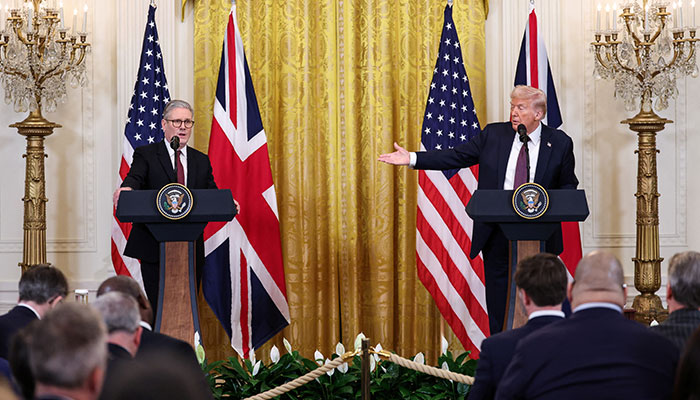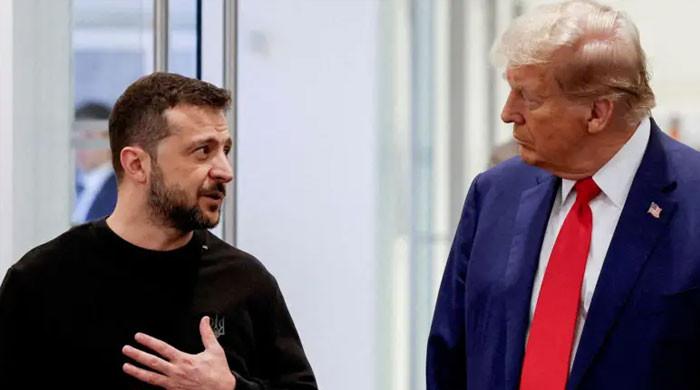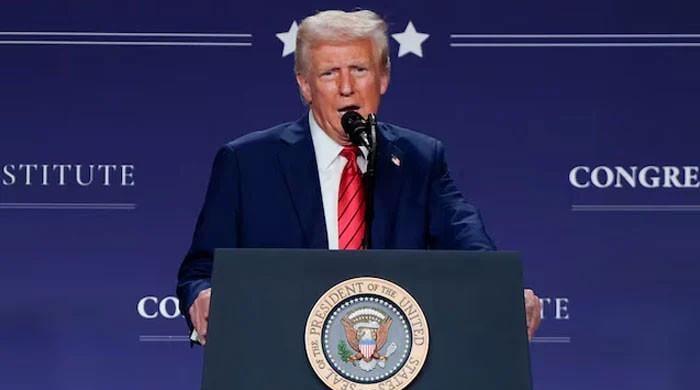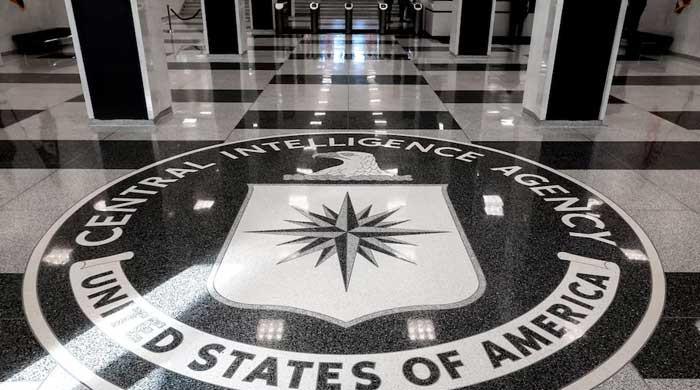Trump stands firm on Ukraine, dismisses Starmer's warning on Putin
“It’s moving along pretty rapidly,” says Trump of ceasefire diplomacy between Ukraine and Russia
February 28, 2025

- Trump refuses Starmer's plea of military support for Ukraine.
- Says US mineral deal with Kyiv enough for Ukraine security.
- US president accepts King Charles invitation for UK state visit.
WASHINGTON: US President Donald Trump has dismissed British Prime Minister Keir Starmer’s call for greater American military support for Ukraine, insisting instead that a minerals deal with Kyiv is the key to ensuring its security against Russia.
Starmer, who was meeting Trump at the White House for the first time since the US leader started his second term, turned on the charm, saying peace in Ukraine had only become possible because of Trump.
In the Oval Office, Starmer handed a letter of invitation from King Charles for a state visit. Trump accepted. A date has not been set.
But underlying differences between the allies remained on the table for the private conversation that followed. They include transatlantic frictions over US-Russia talks aimed at ending the Ukraine war.
Before the meeting, Starmer had argued that there could be no long-term peace in Ukraine without firm US security guarantees – an argument Trump all but dismissed.
“We are a backstop because we’ll be over there, we’ll be working,” as a result of the economic partnership, Trump said. “We’re going to have a lot of people over there.”
Starmer is the latest European leader to meet Trump after French President Emmanuel Macron came to the White House on Monday for a friendly encounter that nonetheless displayed stark differences about Russia’s war with Ukraine and the US push for a quick ceasefire.
“It’s moving along pretty rapidly,” Trump said of ceasefire diplomacy, expressing optimism that Russian President Vladimir Putin would keep his end of any bargain. “It will either be fairly soon or it won’t be at all.”
“We have to get it right,” said Starmer at a joint press conference with Trump. “It can’t be peace that rewards the aggressor.”
Shocking allies
Trump, who came into office on January 20, has shocked traditional US allies in Europe by drawing closer to Putin, calling Ukrainian President Volodymyr Zelenskiy a “dictator,” and demanding payback for US financial support for Kyiv. On Thursday, Trump distanced himself from the dictator comment and said he gets along with the Ukrainian leader.
Zelenskiy is expected to be in Washington on Friday to sign an agreement with Trump on rare earth minerals, a deal the Ukrainian leader said would hinge on further US aid. Trump portrays the deal as a way to recoup American money that has been spent to support Ukraine. It includes no specific security guarantees for Ukraine.
Starmer has signalled that Britain will increase defence spending and is expected to try to reassure the US president that Europe will provide support and security guarantees to Kyiv if peace talks with Russia are successful.
A senior Trump administration official told reporters they were pleased with Starmer’s pledges to increase defence spending.
Putin on Thursday warned “Western elites” against trying to sabotage a potential rapprochement between Russia and the United States, saying Moscow would use its diplomats and intelligence services to thwart such efforts. The remarks were an apparent reference to the European Union and Britain.
Trump has shattered foreign policy and domestic policy norms since the start of his second term, rattling allies by advocating for US ownership of the Gaza Strip and by promising trade tariffs on US friends and foes alike.
Trump said the US would reach a trade deal with Britain “very shortly,” hours after one of his aides told reporters they were seeking an “economic relationship with the UK to be based on reciprocal and equal trade.”
In the Oval Office, Trump complained about trade relations with the European Union, which Britain left in 2020.
“On our trade, obviously, it is fair and balanced,” Starmer interjected, “and in fact you’ve got a bit of surplus so we’re in a different position.” The US has a trade surplus in goods with Britain, according to US government statistics.
Meanwhile, US Vice President JD Vance, who also attended the meeting, said the leaders would discuss what he described as “infringements on free speech” in Britain that have affected US technology companies.
“We’ve had free speech for a very, very long time in the United Kingdom,” Starmer responded.
Friendly relations
Trump’s relationship with Starmer got off to a friendly start in September with a two-hour dinner in New York at Trump Tower. The British leader’s team said the atmosphere was warm with a “gracious host.”
Like Macron, Starmer will argue that a rushed peace deal with Russia, without the participation of Ukraine or European nations, might lead to further instability in Europe, which would not be good for the United States.
Starmer has said he is open to British troops providing security guarantees to Ukraine but only alongside other European nations and with “the right conditions in place.”
European countries are concerned about the high level of conflict in Ukraine now, the US official said, while a ceasefire would give them more comfort that their role is more about peacekeeping than deterring active conflict.
“The type of force depends very much on the political settlement that is made to end the war,” the US official said. “That trade-off is part of what the leaders today are going to be discussing.”











